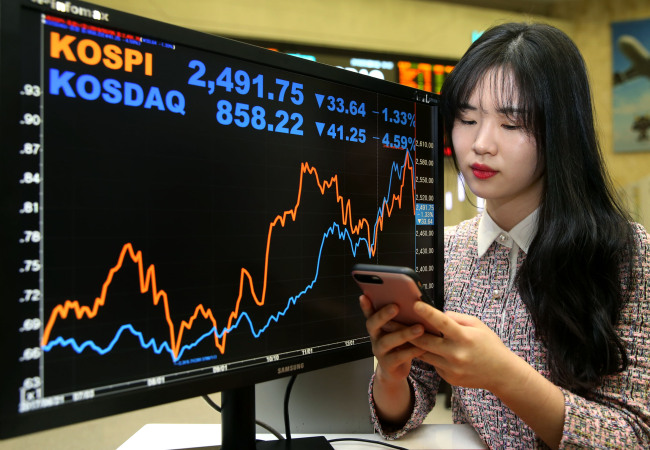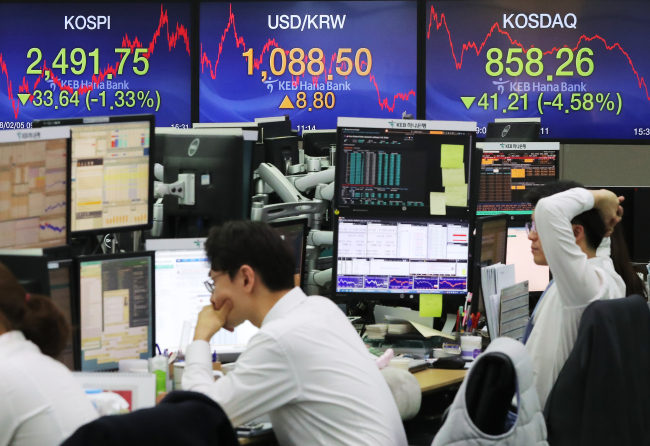South Korea’s stock markets tumbled and sovereign bond yields rose sharply Monday in sync with other bearish financial markets in the United States and Asia, amid the US Federal Reserve’s signal for a March rate hike, the hawkish remarks of outgoing Fed chair Janet Yellen and the strengthening dollar.
Analysts here said the impact on the market from the hawkish US Fed is inevitable, but at the same time played down possibilities of a lingering impact on the market.
Analysts here said the impact on the market from the hawkish US Fed is inevitable, but at the same time played down possibilities of a lingering impact on the market.

Korea’s top-tier Kospi tumbled 1.3 percent compared to Friday and closed at 2,491.75, while its second-tier Kosdaq sank 4.6 percent, the largest drop since June 2016. The Kospi fell for two consecutive trading days, while the Kosdaq was weak for five straight trading days. The new composite benchmark KRX 300 on its debut day fell 1.6 percent.
Foreign sell-offs triggered the drop Monday. Foreign investors net sold Kospi shares worth 454.4 billion won ($417.5 million) and Kosdaq shares worth 222.4 billion won.
On the bond market, the three-year state bond yield climbed up 3.7 basis points and 10-year bond yield surged 4.7 basis points, according to an estimate by the Korea Financial Investment Association. The 50-year bond yield rose 3.6 basis point.
When bond yield increases, the bond price falls, and vice versa, meaning Monday’s market showed a bearish trend.
The won-dollar exchange rate came to 1,088.5 won at the session’s close, as the local currency weakened against the dollar by 8.8 won compared to Friday close. This marked the fourth straight trading day that the dollar rose against the Korean won.
Foreign sell-offs triggered the drop Monday. Foreign investors net sold Kospi shares worth 454.4 billion won ($417.5 million) and Kosdaq shares worth 222.4 billion won.
On the bond market, the three-year state bond yield climbed up 3.7 basis points and 10-year bond yield surged 4.7 basis points, according to an estimate by the Korea Financial Investment Association. The 50-year bond yield rose 3.6 basis point.
When bond yield increases, the bond price falls, and vice versa, meaning Monday’s market showed a bearish trend.
The won-dollar exchange rate came to 1,088.5 won at the session’s close, as the local currency weakened against the dollar by 8.8 won compared to Friday close. This marked the fourth straight trading day that the dollar rose against the Korean won.

The strengthening dollar weighs on the local stock market, which comes in contrast to previous hints at rate hikes in the US and the European Central Bank, wrote Cho Ik-jae, chief strategist at Hi Investment & Securities, in a note Monday.
“The strengthening dollar was key to downward pressure on the stock market,” Cho wrote, adding the unprecedentedly fast pace of weakening in the dollar has dwarfed the pace of the rate hike in the US, leaving unscathed the local stock markets’ uptrend.
Market volatility here will inevitably widen in the short term, he added,
Such signals, however, are unlikely to have lingering effects, like a “taper tantrum,” Cho wrote, referring to investors’ panic in 2013 following then-US Fed Chairman Ben Bernanke’s hint at slowing the purchase of bonds. Cho cited robust economic readings and a rise in commodities price.
Another analyst, Lee Kyoung-min of Daishin Securities, said the sudden rise in US Treasury yield and the following currency rate volatility stirred stock market volatility at home and abroad. But Lee said the impact would be limited, unless there are adverse signs of global economic recovery.
Meanwhile, Lee Kyung-soo, a quant analyst at Hana Financial Investment, wrote in a Monday note that extremely underpriced stocks on the Korean market are the only way to hedge market risks.
These came in the wake of bearish US markets Friday. Dow Jones Industrial took the largest loss since June 2016 -- by 2.5 percent. US broad-based S&P 500 fell 2.1 percent and the tech-heavy Nasdaq Composite tanked 2 percent.
Moreover, the MSCI All Country World Index dropped 3.4 percent last week, the biggest slide since January 2016.
Yellen during her last meeting of the Federal Open Market Committee in her tenure Wednesday kept the interest rate flat but expected the economy to expand at a moderate pace citing solid jobs data, Moreover, her remark during an interview with CBS News indicating stocks are highly overvalued appears to have added to pressure on Korean markets.
“Well, I don’t want to say too high. But I do want to say high,“ she said. ”Price-earnings ratios are near the high end of their historical ranges,”
By Son Ji-hyoung
(consnow@heraldcorp.com)
“The strengthening dollar was key to downward pressure on the stock market,” Cho wrote, adding the unprecedentedly fast pace of weakening in the dollar has dwarfed the pace of the rate hike in the US, leaving unscathed the local stock markets’ uptrend.
Market volatility here will inevitably widen in the short term, he added,
Such signals, however, are unlikely to have lingering effects, like a “taper tantrum,” Cho wrote, referring to investors’ panic in 2013 following then-US Fed Chairman Ben Bernanke’s hint at slowing the purchase of bonds. Cho cited robust economic readings and a rise in commodities price.
Another analyst, Lee Kyoung-min of Daishin Securities, said the sudden rise in US Treasury yield and the following currency rate volatility stirred stock market volatility at home and abroad. But Lee said the impact would be limited, unless there are adverse signs of global economic recovery.
Meanwhile, Lee Kyung-soo, a quant analyst at Hana Financial Investment, wrote in a Monday note that extremely underpriced stocks on the Korean market are the only way to hedge market risks.
These came in the wake of bearish US markets Friday. Dow Jones Industrial took the largest loss since June 2016 -- by 2.5 percent. US broad-based S&P 500 fell 2.1 percent and the tech-heavy Nasdaq Composite tanked 2 percent.
Moreover, the MSCI All Country World Index dropped 3.4 percent last week, the biggest slide since January 2016.
Yellen during her last meeting of the Federal Open Market Committee in her tenure Wednesday kept the interest rate flat but expected the economy to expand at a moderate pace citing solid jobs data, Moreover, her remark during an interview with CBS News indicating stocks are highly overvalued appears to have added to pressure on Korean markets.
“Well, I don’t want to say too high. But I do want to say high,“ she said. ”Price-earnings ratios are near the high end of their historical ranges,”
By Son Ji-hyoung
(consnow@heraldcorp.com)











![[Today’s K-pop] BTS pop-up event to come to Seoul](http://res.heraldm.com/phpwas/restmb_idxmake.php?idx=644&simg=/content/image/2024/04/17/20240417050734_0.jpg&u=)





![[KH Explains] Hyundai's full hybrid edge to pay off amid slow transition to pure EVs](http://res.heraldm.com/phpwas/restmb_idxmake.php?idx=652&simg=/content/image/2024/04/18/20240418050645_0.jpg&u=20240418181020)

![[Today’s K-pop] Zico drops snippet of collaboration with Jennie](http://res.heraldm.com/phpwas/restmb_idxmake.php?idx=642&simg=/content/image/2024/04/18/20240418050702_0.jpg&u=)